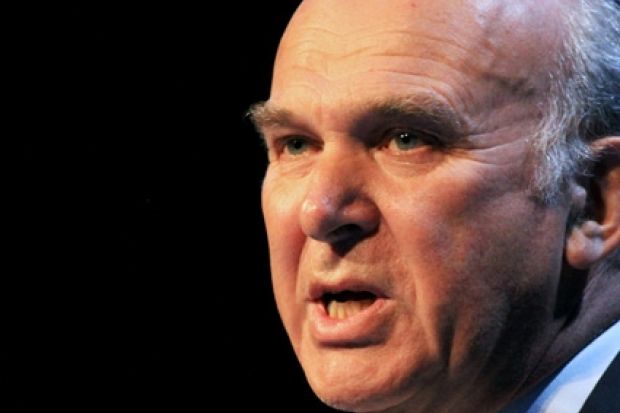Universities are being “economically irrational” by planning to charge tuition fees close to £9,000 and face permanently losing places if they fail to fill courses at that price, the business secretary has warned.
Speaking today at the annual conference of the Higher Education Funding Council for England, Vince Cable said that using high charges as an “insurance policy” against uncertainties would serve only to “magnify risk”.
As well as warning institutions that student places were under threat, the minister announced that the government planned to end Hefce moderation funding, which mitigates sharp year-on-year changes in grant allocations.
Mr Cable also insisted there should be “variability” in fees between subjects within universities to reflect the different costs of providing courses.
He told the conference at Aston University in Birmingham that institutions could not expect to live in a “cost-plus world” given the pressure on public sector spending.
He said he expected “a ferment of creative thinking…so as to promote higher-quality but lower-cost teaching”.
Mr Cable added: “I may be missing something, but I haven’t seen much evidence of this.
“I’ll go further. The attempt by universities to pitch their charges near the top of the range is a zero-sum [game] in terms of available resources. It is economically irrational on a collective basis – and it’s very likely irrational in individual cases, too.”
The business secretary said that where places were unfilled, “we might then withdraw those places. An institution should not assume they would easily get them back.”
He accepted that current controls on student numbers were restrictive – he labelled them “Stalinist” – but said that an overall cap on places was necessary while the government subsidised loans.
However, he confirmed that the coalition was looking at allowing individual universities, further education colleges and private providers to expand if they decided to charge lower fees.
Meanwhile, Mr Cable also attacked reports that the government’s funding reforms were in danger of opening up a £1 billion hole in its budget due to the cost of student loans.
He said this was “wilful exaggeration”, adding that fee waivers and scholarships needed to be taken into account.
Mr Cable's comments on the prospect of places being allocated in the light of fee levels appeared at odds with Sir Alan Langlands, Hefce's chief executive, who spoke just before the minister.
In a question-and-answer session, Sir Alan warned against a system where places were allocated solely on the basis of price.
He said it would not be a "terribly respectful policy position", adding that from his experience of running the NHS, such an approach would lead down a cul-de-sac.
In his speech, Sir Alan also warned against the higher education sector being used as a "political football".
Aaron Porter, the president of the National Union of Students, also took Mr Cable to task, describing elements of his speech as “extraordinary”.
“For ministers who presided over the creation of a funding system that encourages universities to charge the highest fee to try to pass the blame to universities and the consequences to students is shameful,” Mr Porter said.
“Ministers are facing consequences that everyone but them saw coming when they rushed through changes to tuition fees and they are in a state of panic.
“Vince Cable’s speech today [attempted] to fix one rushed policy by throwing around a series of similarly desperate initiatives, none of which stand up to examination.”
Register to continue
Why register?
- Registration is free and only takes a moment
- Once registered, you can read 3 articles a month
- Sign up for our newsletter
Subscribe
Or subscribe for unlimited access to:
- Unlimited access to news, views, insights & reviews
- Digital editions
- Digital access to THE’s university and college rankings analysis
Already registered or a current subscriber? Login
